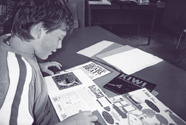![]() ASSESSING
CHILDREN’S COMPREHENSION THROUGH ORAL READING
ASSESSING
CHILDREN’S COMPREHENSION THROUGH ORAL READING
![]()
Ray
Griffiths
This
study involved a random sample of nine Year 4 students and 10
Year 8 students reading aloud two fiction passages as part of
the NEMP 2000 reading assessment. The purpose of this study was
to see how the students’ comprehension of what they were
reading (determined by teacher-administrators asking them questions)
compared with their word accuracy on the tasks and was influenced
by various factors surrounding task administration and marking.
|
Complete
running observational records were made of the students’ videotaped
reading performances. The asking of the comprehension questions was observed
and marked. Word accuracy, self-correction rates and comprehension were
scored and a descriptive comment was made about the students’ reading
and other observable behaviours. The teacher-administrators’ handling
of the task was also observed.
| •
The comprehension performance of both Year 4 and Year 8 students fell
far short of their word accuracy ability. • The average self-correcting ratios of 1:7 and 1:4.3 for Years 4 and 8 respectively are a concern. Thirty-three percent of the Year 4 sample and 62% of the Year 8 sample achieved an acceptable rate of self-correction. • Achievement on the literal questions was markedly better than on the questions requiring higher order thinking. • The inferential/higher order type questions fell into the categories of passage dependent and passage independent. Year 4 students correctly answered 33% and 0% respectively. Year 8 students correctly answered 30% and 53% respectively. |
•
Many students were given reading assessments based on passages that
could be read at an easy rather than instructional level.
|
![]()
| •
Findings appear to confirm the concern of many teachers that reading
instruction produces word-accurate readers at the expense of understanding.
Reasons for this may be: – pressure on teachers to show progress by using the Ready to Read colour wheel and reading age compared to chronological age – over-emphasis on word accuracy measures of reading achievement – teachers’ lack of knowledge of the comprehension process, its complexity, range of levels and the strategies readers need to have at their disposal. • Reading is a skill that goes well beyond literal and inferential meanings. When interacting with texts, readers require specific and generalised experience and world knowledge that will enable reasoned responses to questions, issues and problems that arise and are outside of anything that is stated or inferred in the text (i.e., are text independent). |
•
Students need considerable ongoing opportunity to engage in reading
as a search for meaning. Identifying when text doesn’t make
sense, wanting to improve it, having the strategies to do this and
then making the self-correction must be taught and practised. • Oral reading assessment tasks remain common practice, but they are not a suitable means of determining comprehension performance. Better ways are needed. • Comprehension happens mostly during reading, not after the event. Teachers must ensure readers know the task, establish rapport with them, capitalise on their interests, establish eye contact, engage them before giving instructions or asking questions, and be prepared to do some prompting and to repeat and rephrase questions. |
